- Home
- Julia Quinn
The Lady Most Likely... Page 10
The Lady Most Likely... Read online
Page 10
The girls’ faces brightened. She couldn’t remember ever being such a silly little cluck, but one had to assume she had been. She lowered her voice. “Have any of you met Captain Neill Oakes yet?”
They all shook their heads.
“A war hero,” she told them. “I was there when he was presented to the queen.”
The girls smiled politely. No, she was never this silly. “Of course, he had a terrible reputation before he left for the Continent,” she added. “Quite the rake! A man that handsome is a danger to young ladies. Your mothers should be very wary, unless the tiger’s changed his stripes.” The polite disinterest fell from their faces, and their eyes sparkled.
She pulled Octavia’s arm closer to her own. “Let’s go for a little walk, dearest. I’d like to show you the view from the west window.”
But she didn’t bother with the view when she got there. “Gwendolyn is going to be your sister-in-law,” she said to Octavia. “And unless I miss my guess, you were about to say something very indiscreet about a future member of your family.”
Octavia’s jaw set with an audible click of her teeth. “You should have seen—”
“Your brother is in love,” Carolyn said, feeling a bit sorry for Miss Darlington. Clearly, she was so jealous that she couldn’t see past her own nose.
Octavia nodded. “I know.”
“And Gwendolyn as a family member might be very different from Gwendolyn as a rival,” Carolyn pointed out. “She’s a lovely person, and I would quite like to have her as my sister. I was hoping she would fall in love with my brother Hugh.”
“I suppose I’m lucky,” Octavia said. To Carolyn’s dismay, her eyes welled with tears. “I get to stand next to her for the rest of my life, so that everyone can compare my figure to hers, and comment on how nice she is, and how sweet she is, and then they can have fun talking about how unpleasant I am!”
“Octavia!” Carolyn cried. “It won’t be like that!”
Octavia dashed away a tear falling down her cheek. “She made me out to be just horrible in front of my brother,” she said, gulping a little. “She—she said that she’d give anything to have just one more minute with her deceased brother, as if—as if I didn’t love my brother, and I do.”
“I’m sure that wasn’t what she meant,” Carolyn said, winding an arm around Octavia’s shoulder. “I’d guess you had said something to Alec, didn’t you? Something Gwendolyn didn’t like?”
Octavia nodded.
“And she defended him. Do you know what, Octavia? From now on, your brother is going to have someone who loves him so much that she will always defend him. He’s found someone who will be with him, and beside him, for life. Who will stand at his shoulder, and give him babies, and generally love him that much.”
Octavia smiled mistily. “That sounds so … nice. Do you—do you love the marquess that much?”
Carolyn looked over her shoulder and met Piers’s eyes. Her heart panged at the very look of him. “Yes,” she said without hesitation. “Yes, I do. And you’ll find someone like that too, Octavia. But meanwhile, you simply must be happy for your brother, and for Gwendolyn.”
“I will,” Octavia said, taking a deep breath. “I’ve been rather a beast and—and I will.”
Piers touched Carolyn’s shoulder. “Thought you wanted me,” he said. “You had that look in your eye.”
Octavia dropped a curtsy. “I’ll go find my brother,” she said. “I believe I forgot to congratulate him on his betrothal.”
Piers wrapped an arm around Carolyn. “Meddling, weren’t you?”
She looked up at him and grinned. “Only a little.”
Chapter 10
Four years earlier …
Miss Katherine Peyton watched the tall, broad-shouldered young man stride away down her family manor’s drive and saw an opportunity for a private interview with him that she’d been seeking for days.
Had Miss Peyton been older, or wiser, or less riveted by her own intentions, she might have discerned the rigidity in the young Neill Oakes’s bearing, the swift anger of his stride, or noted that though he’d forgotten his hat and his thick ebony hair was wind-whipped and his face red with the chill of the blustery November day, he seemed oblivious to it. And she might have wondered why.
But she was not older or wiser, and being absorbed with her own confused and riotous emotions, she did not wonder why. She was just sixteen, newly conscious of her budding femininity and eager to test its effect—especially on the young man heading down the drive. It never occurred to her to ask herself what he’d been doing at Bing Hall in the first place. Neill Oakes treated Bing Hall as his own and had since she could remember, behavior from which neither her mother—when she’d been alive—nor her father to this day had ever dissuaded him.
Perhaps Mr. Peyton felt sorry for Neill because he had no siblings and his mother had died but a few years back and he had resisted the importation of a new stepmother, very soon afterward, and the arrival of twin half brothers soon after that, twin brothers everyone in Burnewhinney County agreed were interestingly well developed for being said to be so premature.
Or perhaps Mr. Peyton appreciated Neill’s having interceded at Eton for Tom, Mr. Peyton’s heir and two years Neill’s junior, delivering him from the servitude most junior lads endured there. Or, perhaps Mr. Peyton simply liked the lad, for Neill Oakes did have a devilish quick wit and a winning way and not only with the local lasses. He was just the sort of neck-or-nothing young blood that older country gentlemen liked to think they themselves had been at such an age.
But none of these things crossed Miss Peyton’s mind as she grabbed her bonnet from her dresser and dashed down the stairway and through the back hall into the kitchen, where she plucked the housekeeper’s shawl from a hook by the outside door and made her escape, hurrying after Neill.
Because she was intent on a kiss.
Gunmetal gray clouds scuttled low above the rustling gold and russet leaves of the poplar-lined avenue. A curt wind, heavy with the promise of storm, nipped at her nose and whipped the long satin sashes of Kate’s bonnet, sending them streaming behind her like derby pennants. Neill was a hundred yards ahead of her by the time she made the avenue. She called out, but her voice was drowned in the rattle of leaves, so she lifted her light muslin skirts and ran, heedless of decorum.
She had loved Neill Oakes for as long as she could remember, and though she had never mistaken her emotions for sisterly affection, it had never occurred to her until lately that what she felt was more than friendship. But over the last year she’d found herself looking forward to his visits, eager to engage in verbal swordplay with him, and growing oddly breathless at the sight of his shirtsleeves rolled up over his extremely masculine forearms. She caught herself studying the shape of his lips and wondering about their texture and realized that over the last months she’d become captivated by the hint of an Irish brogue he’d learned from his mother. She found herself eager to enter any conversation that included him as a subject, and as he was a hell bent babe, this was most conversations.
His reputation as a budding blackguard did not worry her; she knew him well. Better than anyone else.
She’d been with him when the groom’s son had fallen into the river, and he’d dived right in to save the lad, never saying a word to anyone afterward lest the boy be punished for his carelessness. And she’d witnessed the tender way he held his infant half brothers and the civility with which he responded to his stepmother’s ceaseless criticisms. And she knew, too, how deep was the sense of honor in this man whose name was a byword for rakehell.
Once he gave his word, nothing could induce him to renege upon it. Her brother Tom had told her how Neill had labored in Bucky Buckstone’s field, hauling rocks the size of melons for five days straight when his father, angry over some imagined irregularity in a bill, had refused to pay an outstanding debt to the man. Neill had assumed the debt himself, offering his back and brawn in payment.
Oh, not
that she mistook Neill for a saint. Far from it. He gambled often, his recklessness putting others—including her brothers—at risk as well as himself, and while he might listen civilly to his stepmother’s complaints, they did not influence his behavior. Not one bit. He loved nothing better than a good brawl—Tom and he had blacked each other’s eyes innumerable times—and he drank too much and too often.
And she was fully aware of his reputation with the local girls. She’d have had to be deaf not to, for her brothers—who considered Neill a paragon of all things masculine—were constantly discussing his conquests, and they made little beyond a cursory effort to exclude themselves from her hearing. Indeed, sometimes she overheard Neill himself extolling some girl’s—well, virtue would hardly be the word for it.
But lately Neill’s love life, which she had once sniffed at in disgust, now provoked … well, jealousy. He was ever toasting some country beauty at the Black Lion, but never her. He never danced with her at all at any of the local balls and fetes except for the sillier country dances that even children were invited to join in.
He should have. She was very pretty. She had only to look in the mirror to see that her skin was snowy and fine, her hair mirrored the color and sheen of milkweed floss, and her eyes, rather than the pale orbs that generally went with light coloring, were darkest blue, almost black, and therefore remarkable. Of course, she would never have much of a figure. She was simply too short and too reedy. But Harry Fentmorgan, the curate’s nephew and a viscount, had told her at this year’s harvest ball that she was as delicate as a faerie princess.
When she had informed Neill of this, he’d laughed.
But three nights ago, Billy Eggs, the smithy’s apprentice, had raised his pint at the Black Lion and toasted her. She had it firsthand from her maid, Nell, who was second cousin to Nance Hightower, one of the tavern’s maids. She’d told Nell, who’d told her, that Billy Eggs had lifted his pint at quarter past ten on Friday evening last, and declared loudly, “To Miss Kate Peyton, the prettiest girl in Burnewhinney County.”
Some of the other men present had shouted “To Miss Peyton”—in and of itself, most gratifying—but Neill Oakes had jumped up from his seat “like a bull who’d been stung on the arse” and knocked the pint from Billy’s hand, saying, “You won’t be toasting Miss Peyton as though she was a common wench. Not in my presence,” and everyone had gaped because Neill Oakes was the last man in the county to stand on ceremony, and to hear him upbraid Billy Eggs, with whom he’d shared many an untoward adventure, in so rough a fashion was amazing.
And then Billy had hit Neill, and the whole place had dissolved into a drunken brawl …
But that wasn’t the part that interested Kate—evenings at taverns often dissolved into drunken brawls—what interested Kate was why Neill Oakes had taken such exception to her name being toasted in a tavern. Could it be, she wondered, because he had an especial regard for her good name? And if so, as what? A family friend or something more …?
The question, once planted, had grown in significance with each passing hour, plaguing her as sorely as the hives she’d developed after eating mussels last spring. And with just as little relief. For from being ever underfoot, Neill had suddenly and unaccountably disappeared from their home, robbing her of the opportunity to gauge what, if any, tender regard lurked in his jetty eyes.
And if she discerned none? Well, then there was nothing for it but that she ask him flat out why he’d struck Billy Eggs, and if his actions were prompted not by romantic feelings but by a few pints, then it was time—past time—that Neill Oakes started seeing her as a woman.
Either way, by the time she left Neill’s company this afternoon, she intended to learn firsthand the texture of Neill Oakes’s lips.
She caught up with him on the banks of the river that separated their properties just as he was about to cross the footbridge that led to his family’s estate.
“Neill!” she cried out, clutching her bonnet tight to her head against the blustering wind as long tresses of her hair whipped her cheeks pink.
He wheeled around, his thunderous expression smoothing when he saw that it was she, though no welcoming smile encouraged her nearer. But Kate had never needed an invitation to do what she wanted, so she hastened to his side, startled when he bowed as though she was a lady and he a gentleman and they were meeting on the streets of London and not by a muddy river. His good manners lasted exactly as long as it took him to incline his head, for as soon as he raised his eyes, he scowled again.
“What are you doing here, Kate?”
“Following you,” she said, searching his eyes for a telltale sign of ardor. The only emotion she saw was exasperation, the same emotion she’d seen in him when she’d painted his father’s prize broodmare pink at the county fair when she was ten. She wrapped her shawl close against her, one hand on her bonnet to keep it from blowing off.
He combed his thick dark curls back with his hand. “Well, what do you want?”
“Where have you been? It’s been nearly a week since we saw you and you were just at the house but you left without seeing Tom and he was there. It seems most odd. I can only surmise that you have been banned from the premises.” She said it lightly, in jest, and therefore did not see the slight jerk that her words invoked. “Have you finally done something that challenges even Father’s seemingly limitless ability to find excuses for you?”
“Has no one ever taught you it is rude to pry?” he countered.
“They’ve tried,” she replied, “but how will I find out that which I want to know if no one will volunteer to tell me? Would you rather I sneaked about, ferreting things out? Of course not. ‘Twould be most distasteful. All in all, I’d rather be thought rude than artful.”
He shook his head, his frown becoming a rueful smile, then a laugh. “Out of the mouths of babes …” he said.
“I am not all a babe anymore, Neill,” she said, just as the first drops of icy rain began to fall, lightly pelting her upturned face. She shivered. “I am sixteen.”
He smiled again. “Yes, I seem to recall you pestering me for a present a few weeks back,” he said, shrugging out of his greatcoat and draping it about her shoulders. The big garment swallowed her in its folds, the hem pooling on the damp ground, covering her toes. At once, the scent of him surrounded her, and the heat trapped in the wool warmed her. But she longed for a more intimate knowledge of his scent and warmth from his arms, not his coat.
“Many young ladies have come out by the time they are my age and are even engaged.”
He’d taken hold of the lapels on either side of her neck and was busily buttoning the closure but at her words his hands froze and his expression closed up. “Yes.”
“I daresay I shall have my share of suitors.”
“I have no doubt of it.”
This was not going at all as Kate had imagined. So, she abandoned her attempts to subtly tease some sign of jealousy from him in favor of her usual modus operandi—bluntness.
“I doubtless shall be kissed, too,” she said.
“Be damned you will!” The words broke from him with such unexpected force she blinked. He flushed angrily.
“What is the meaning of this, Kate? Why are you plaguing me with your plans for a disreputable future?”
Her eyes went wide. “Disrep—Neill Oakes, I should think you would be satisfied with your current stable of faults without adding hypocrisy to the lot. If a kiss makes a girl—a woman disreputable, then there is not a young lady over seventeen in Burnewhinney who can claim respectability, except for Nigella Lumley, and her unkissed status is certainly not due to a lack of effort in the matter.”
“I am certain you exaggerate.”
“I do not,” she told him truthfully, and in her earnestness, leaned forward and placed her two small hands flat upon his chest. His heart beat thickly against her palms. “And I should think you of all people should realize it seeing how in all likelihood ‘tis you who are responsible for many of th
ose despoiled lips.”
“You shouldn’t say such things, Kate. You shouldn’t know such things,” he said, quite hotly, but flushing even more deeply than before.
“Why ever not?” she asked, quite sincerely flummoxed.
“Because it … it ain’t nice, that’s why,” he said.
She laughed at this strange incarnation of Neill Oakes, the county’s foremost scoundrel. “That’s not what Mary Grant said. Or Beatrice Lumley.”
“God help me,” Neill choked out.
Kate raised a brow. “From what exactly is the Almighty to be saving you?”
“You.”
“Me?” she asked, her wide-eyed surprise turning swiftly to fascination. “Why me?”
He looked down into her upturned face for a long minute before unhappily lifting his hand to sweep a strand of hair from the corner of her mouth. “You are a plague to me, Kate Peyton.”
“Of course I am. Or so you have claimed for years. What of it? You are acting most oddly, Neill.” Because finally, she realized that he was, indeed, acting oddly. His manner was agitated and angry, his gaze accusatory and fierce, and … unhappy. She moved closer, searching his dark visage for some clue as to what ailed him.
“What is it, Neill? Have you … have you really done something awful this time?” she asked worriedly.
“Yes. No!” he said. “Blast and damnation. What do you want of me, Kate?”
She blinked up at him. “Why, a kiss.”
He stared down at her, and she noted absently the way the icy rain had caught like crystals in his black curls and how the shoulders of his jacket were growing dark with dampness and how firm his mouth was and how long and thick his eyelashes.
“I thought it was perfectly clear,” she said softly.
“No,” he whispered like a man condemned and hopeless, which had the extraordinary effect of making her feel intoxicatingly feminine, a woman in a way she never felt before, a woman who was both seductive and powerful. And it gave her the courage and the inspiration to do something she had never before done with Neill Oakes: flirt.

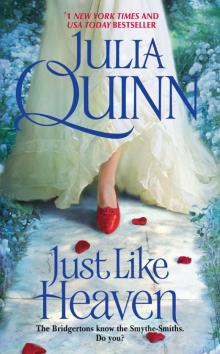 Just Like Heaven
Just Like Heaven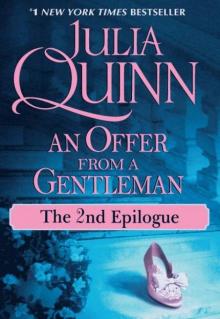 B03.2 An Offer from a Gentleman Ep II
B03.2 An Offer from a Gentleman Ep II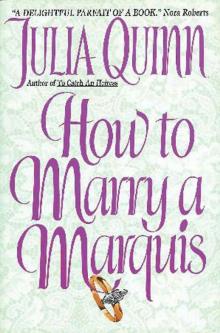 How to Marry a Marquis
How to Marry a Marquis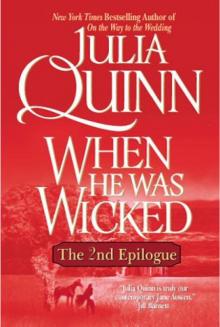 When He Was Wicked: The 2nd Epilogue
When He Was Wicked: The 2nd Epilogue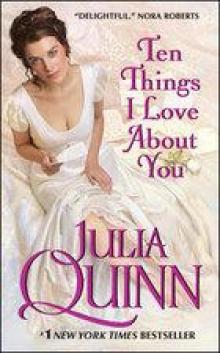 Ten Things I Love About You
Ten Things I Love About You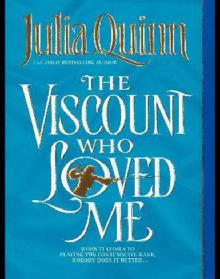 The Viscount Who Loved Me
The Viscount Who Loved Me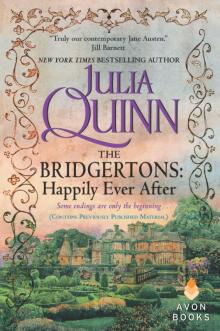 The Duke and I
The Duke and I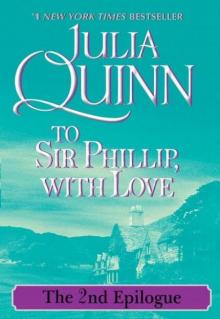 B05.2 To Sir Philip With Love Ep II
B05.2 To Sir Philip With Love Ep II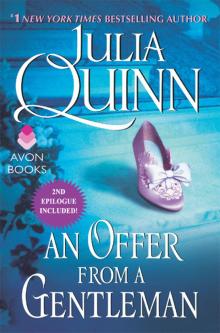 An Offer From a Gentleman: The 2nd Epilogue
An Offer From a Gentleman: The 2nd Epilogue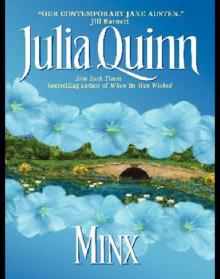 Minx
Minx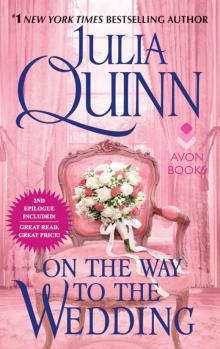 On the Way to the Wedding with 2nd Epilogue
On the Way to the Wedding with 2nd Epilogue Mr. Cavendish, I Presume
Mr. Cavendish, I Presume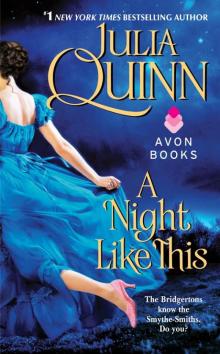 A Night Like This
A Night Like This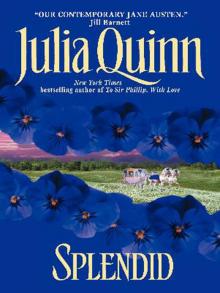 Splendid
Splendid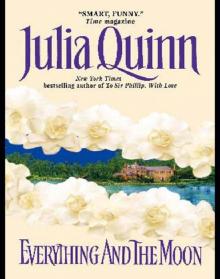 Everything and the Moon
Everything and the Moon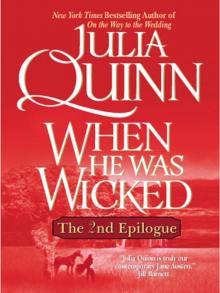 When He Was Wicked
When He Was Wicked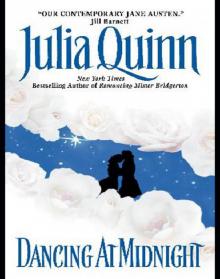 Dancing at Midnight
Dancing at Midnight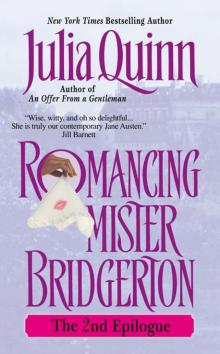 Bridgerton 04: 2nd Epilogue - Romancing Mister Bridgerton
Bridgerton 04: 2nd Epilogue - Romancing Mister Bridgerton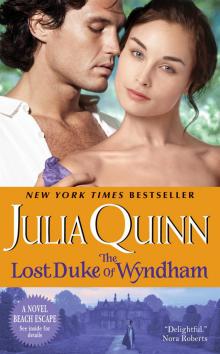 The Lost Duke of Wyndham
The Lost Duke of Wyndham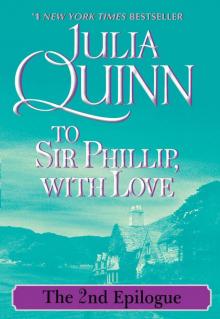 To Sir Phillip, With Love
To Sir Phillip, With Love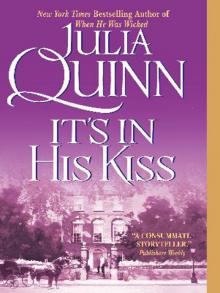 It's in His Kiss
It's in His Kiss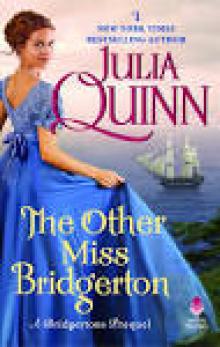 The Other Miss Bridgerton
The Other Miss Bridgerton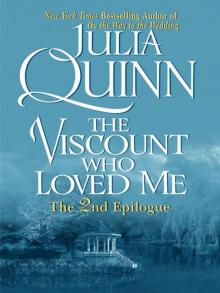 Bridgerton 02: 2nd Epilogue - The Viscount Who Loved Me
Bridgerton 02: 2nd Epilogue - The Viscount Who Loved Me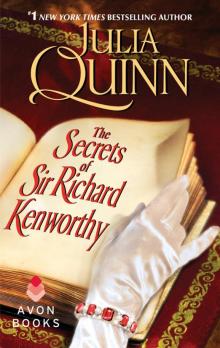 The Secrets of Sir Richard Kenworthy
The Secrets of Sir Richard Kenworthy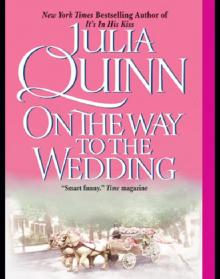 On the Way to the Wedding
On the Way to the Wedding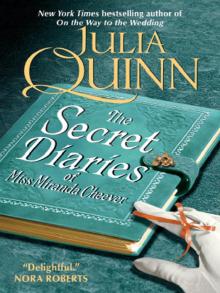 The Secret Diaries of Miss Miranda Cheever
The Secret Diaries of Miss Miranda Cheever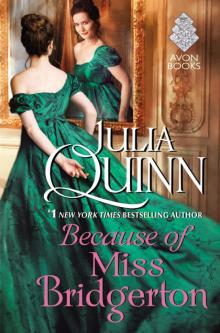 Because of Miss Bridgerton
Because of Miss Bridgerton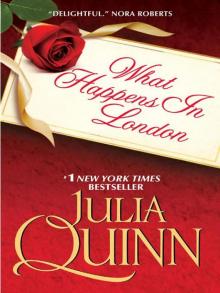 What Happens in London
What Happens in London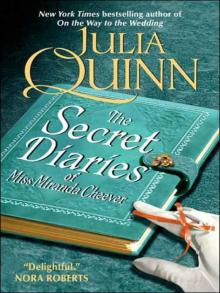 JQuinn - The Secret Diaries of Miss Miranda Cheever
JQuinn - The Secret Diaries of Miss Miranda Cheever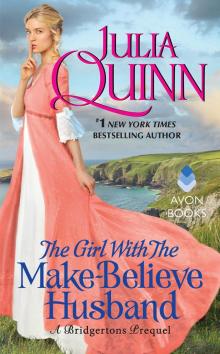 The Girl With the Make-Believe Husband
The Girl With the Make-Believe Husband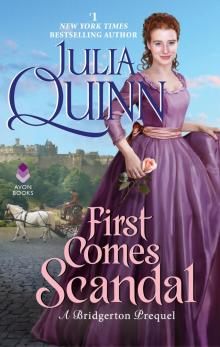 First Comes Scandal
First Comes Scandal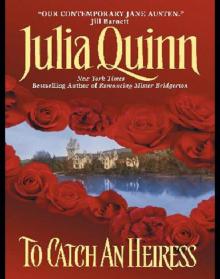 To Catch an Heiress
To Catch an Heiress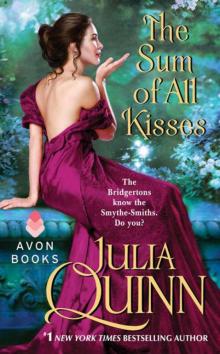 The Sum of All Kisses
The Sum of All Kisses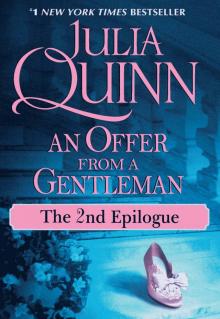 An Offer From a Gentleman
An Offer From a Gentleman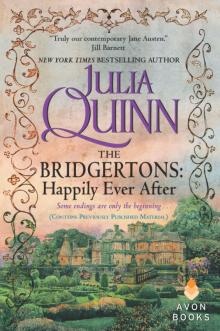 The Bridgertons: Happily Ever After
The Bridgertons: Happily Ever After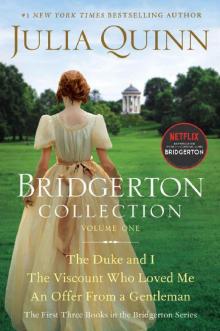 Bridgerton Collection Volume 1 (Bridgertons)
Bridgerton Collection Volume 1 (Bridgertons)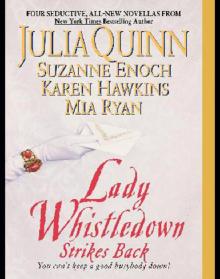 Lady Whistledown Strikes Back
Lady Whistledown Strikes Back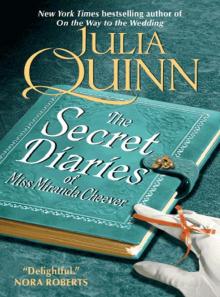 Secret Diaries of Miss Miranda Cheever
Secret Diaries of Miss Miranda Cheever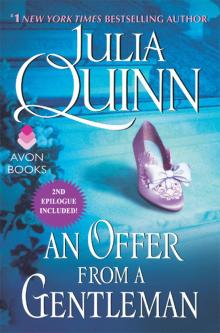 An Offer from a Gentleman with 2nd Epilogue
An Offer from a Gentleman with 2nd Epilogue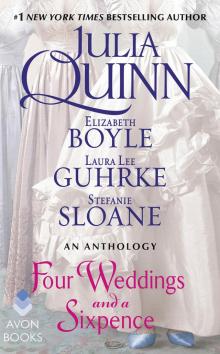 Four Weddings and a Sixpence
Four Weddings and a Sixpence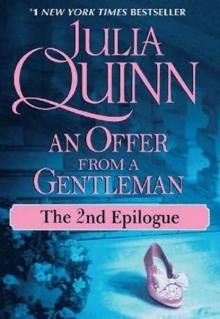 An Offer from a Gentleman: The Epilogue II
An Offer from a Gentleman: The Epilogue II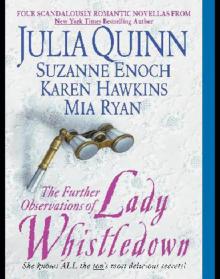 The Further Observations of Lady Whistledown
The Further Observations of Lady Whistledown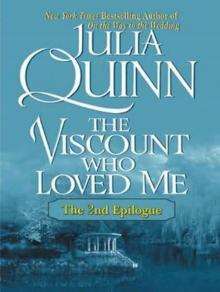 The Viscount Who Loved Me: The Epilogue II
The Viscount Who Loved Me: The Epilogue II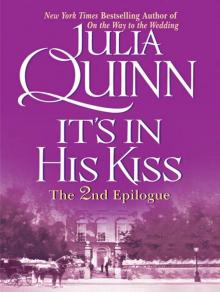 It’s In His Kiss Epilogue II
It’s In His Kiss Epilogue II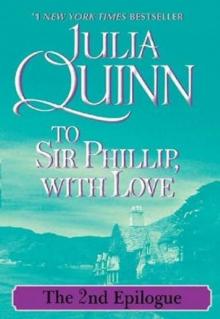 To Sir Phillip, with Love: The Epilogue II
To Sir Phillip, with Love: The Epilogue II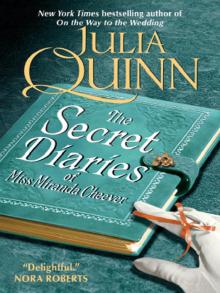 The Secret Diaries of Miss Miranda Cheevers
The Secret Diaries of Miss Miranda Cheevers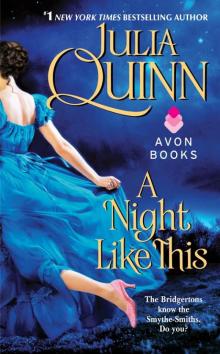 A Night Like This (Smythe-Smith Quartet)
A Night Like This (Smythe-Smith Quartet)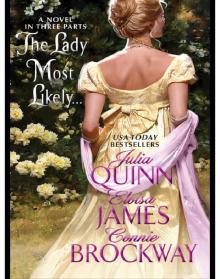 The Lady Most Likely...
The Lady Most Likely...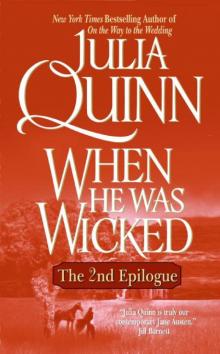 Bridgerton 06: 2nd Epilogue - When He Was Wicked
Bridgerton 06: 2nd Epilogue - When He Was Wicked Just Like Heaven sq-1
Just Like Heaven sq-1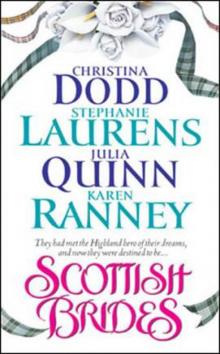 Gretna Greene
Gretna Greene